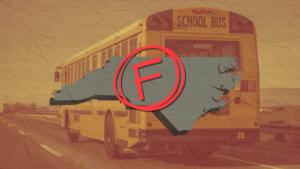Former NC Governor Roy Cooper says his concern over what will happen to Medicaid in North Carolina is what motivated him to run for US Senate in next year’s midterm election. Last week, Cooper invited the press to a roundtable discussion on health care costs and the future of Medicaid with his former Health Secretary Kody Kinsley, as well as a physician, a child care business owner, and a mother of a child with cerebral palsy.
“I’m running for the US Senate because I’m concerned about the cost that everyday families are feeling right now,” said Cooper. “Groceries are higher, utilities are higher, rent is higher, child care is higher, and harder to find. Now, we’re seeing the cost of health care significantly increase or even be eliminated by the ‘big, beautiful bill’ that has just passed.”
Cooper’s biggest accomplishment as governor was negotiating a bipartisan Medicaid expansion that covered over 680,000 North Carolinians who had previously been uninsured. As part of this expansion, he signed all 99 hospitals in the state onto a plan to forgive $4 billion in medical debt for roughly 2 million people, while making it easier for qualified people to access charity care.
Michael Whatley, the head of the RNC when the One Big Beautiful Bill Act (OBBBA) was passed, called it “the embodiment of our agenda” and said it should be the “cornerstone” of Republican messaging going forward. Whatley is now running against Cooper for US Senate in next year’s midterm election.
Cooper described what will be a “nasty shock” when North Carolinians first begin seeing the effects of OBBBA on November 1st, when the ACA Marketplace begins open enrollment for next year. “They’re about to be notified that their health insurance premiums are going through the roof. Because insurance companies are raising their premiums on top of federal subsidies not being renewed by Congress in this ‘big, beautiful bill.’”
In the OBBBA, Republicans in Congress refused to extend ACA tax credits beyond the end of this year. These tax credits currently help about 1 million North Carolinians to afford their monthly health insurance premiums. Between the expiring of those credits and various increases by insurance companies, former Health Secretary Kody Kinsley said some estimates of what he called a “ticking time bomb” put the average price increase for North Carolinians at $650 starting January 1st. He warned, however, that the costs would be much worse for those more likely to need health care.
“A 60-year-old teacher making $60,000 near the end of their career would see their costs go up by $7,000,” Kinsley said. “We expect to see ¼ of the million people in NC who currently benefit from the ACA credits become uninsured because they can’t afford the premiums.”
Kinsley and Cooper both explained that increasing the number of uninsured people in the state will, in turn, raise the costs that everyone else has to pay for health care and insurance. Kinsley also warned of the damage it would do to doctors’ offices and hospitals, especially in rural counties where the brunt of insurance dropping is expected.
“More of the providers in those communities will have people walking through the front door with no way to pay, and you know if you’re a business and you have people coming in the door that have no way to pay, you close. So this is gonna impact our provider community as well.”
Providers are already facing other effects of the Republican bill. Beginning October 1st, unless Republicans in the NC legislature come to an agreement on Medicaid funding, providers will have their rates cut by 3-10% depending on the type of service provided. This stems from the increased burden the bill places on the state through federal cuts to Medicaid, and will effectively limit the number of Medicaid patients providers can afford to treat. Both chambers have passed separate versions of a funding bill, but reportedly, neither is considering the other’s version. The biggest sticking point appears to be disagreement on whether to continue funding the construction of a children’s hospital and a rural health care program.
Rural hospitals will be one of the biggest pain points when Medicaid cuts fully come into effect over the next few years. Governor Josh Stein has flagged five rural hospitals at particularly high risk of closing, but many others will likely have to make hard choices about closing certain units or even ending inpatient care.
State Representative Donny Lambeth (R-Forsyth) worries that the only path for many rural hospitals to survive may be to accept buyouts from larger hospital systems. “I think in 10 years you really won’t see any independent rural hospitals. They’ll all be owned or operated by a bigger system.”
The worst of the potential damage is not yet clear, as the biggest cuts don’t begin until the start of 2027. That’s when new work requirements will add extra paperwork to an already cumbersome process. Cooper has framed these requirements as unnecessary and dishonest. The vast majority of Medicaid users already work, and those who don’t are exempt due to things like being caregivers to very ill family members or being students.
Cooper says the requirements are a backdoor to kicking an estimated 250,000 North Carolinians off Medicaid who are qualified but will be tripped up by the new red tape.
“This bill is designed to intentionally make it more difficult for people who are working and are qualified to get signed up,” said Cooper. “Everybody’s been to the doctor; you know how complex all of these forms are, and everybody’s dealt with insurance. They’ve made it so much harder with all of these new rules that so many people who are working and qualified are going to get kicked off. And that doesn’t have anything to do with waste, fraud, and abuse.”





